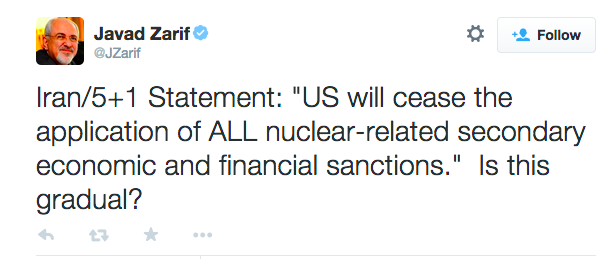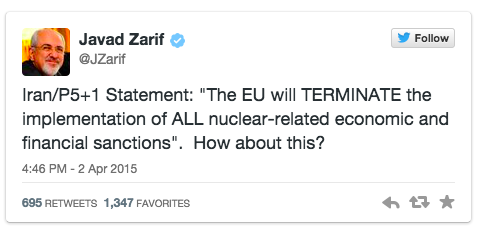
The deal is done. Well, kind of done. On Thursday afternoon, European and Iranian negotiators announced a political framework for an Iranian deal. The technical details of the deal will be reached by the June 30th deadline, after which the deal will begin to be executed.
According to the announcement and a follow-up by President Obama, this deal is meant to extend the time for Iran to break out to achieve a nuclear weapon from three months to one year. There are others who believe the deal doesn't prevent a nuclear Iran.
President Obama's statement in the Rose Garden declared it "a good deal":
Today, after many months of tough principle diplomacy, we have achieved the framework for that deal. It’s a good deal; a deal that meets our core objectives. This framework would cut off every pathway Iran could take to create a nuclear weapon. Iran will face strict limitations on its program. Iran has agreed to the most robust and intrusive inspections and transparency regime ever negotiated for any nuclear program in history. This deal is not based on trust. It's based on unprecedented verification. Many key details will be agreed to over the next few months.
Indeed, according to the fact sheet issued the White House, Iran has agreed to reduce by approximately two-thirds its installed centrifuges. Iran will go from having about 19,000 installed today to 6,104 installed under the deal, with only 5,060 of these enriching uranium for 10 years.
Not mentioned is the fact that those 5,060 centrifuges will not give Iran the capacity to run nuclear power plants, only to create fuel for bombs (the full White House fact sheet on the terms of the deal can be found after the break below).
Other terms include the closing of some plants, conversion of others to research facilities, and letting others enrich materials other than uranium. There also are provisions for "at will" inspections
Iranian Foreign Minister Mohammad Javad Zarif seemed to indicate that the deal is less restrictive than the President claimed:
IMr Zarif told reporters the agreement would show "our programme is exclusively peaceful, has always been and always will remain exclusively peaceful", while not hindering the country's pursuit of atomic energy for civilian purposes.
"Our facilities will continue," he said. "We will continue enriching, we will continue research and development." He said a planned heavy water reactor will be "modernised" and that the Iranians would keep their deeply buried underground facility at Fordo.
"We have taken a major step but are still some way away from where we want to be," Mr Zarif said, calling Thursday's preliminary step a "win-win outcome".
Perhaps, the differences between Obama's and Zarif's statements lie, not in the details of the deal itself, but in what the Iranians can still do within the parameters of deal, and the concessions the U.S. negotiators made.
For example, President Obama was saying as late as 2012: "We know they don’t need to have an underground, fortified facility like Fordo in order to have a peaceful program." But, the Iranians simply refused. So, the Americans caved and said that they could keep it open as a research facility, but they had to remove all the centrifuges for storage. This week, it emerged that the Iranians would be allowed to keep centrifuges spinning inside the mountain. But, instead of spinning uranium, the centrifuges would be spinning germanium or similar non-nuclear elements.
That's what the Administration means when it say there will be no "enrichment" going on at Fordo. Centrifuges spin isotopes into lighter and heavier elements, thereby "enriching" the material. That's what they do. There will be enrichment going on inside the Fordo, but it won't be uranium.
This isn't a minor point. Since the process of enrichment is the same, no matter what is being enriched.
Iran will still have a facility inside a mountain where it will be able to research and develop new generations of centrifuges. Zarif bragged from the stage in Lausanne that Iranian R&D on centrifuges will continue on IR-4s, IR-5s, IR-6s, and IR-8s, and that the pace of research will be tied to Iranian scientific progress. The development of advanced centrifuges would give the Iranians a leg up if they decide to break out, and it will put them instantly within a screw's turn of a nuke when the deal expires.
Or, if Iranians kick out inspectors and dare the world to respond, the West will have zero way to intervene. The Iranians will have a head start on enrichment, and a place to do it beyond the reach of Western weapons. The administration's early pushback has been that the breakout time will still be a year, so it could theoretically, based on the agreement, restore the sanctions - but, it takes more than a year for sanctions to take an economic toll. And trying to sanction a Iran that is a nuclear power is a totally different matter. So, in reality, there are zero options to stop a breakout.
Another difference between Obama's outline and the Iranian foreign minister is when the sanctions will be removed. According to the President, the removal of the sanctions will occur gradually once it is verified that Iran has complied with all elements of the agreement. But, the European statement on the deal and Mohammad Zarif, the Iranian foreign minister, claim sanctions will be removed as each element of Iran's requirements is completed:
The EU will terminate the implementation of all nuclear-related economic and financial sanctions and the US will cease the application of all nuclear-related secondary economic and financial sanctions, simultaneously with the IAEA-verified implementation by Iran of its key nuclear commitments.
The Iranian foreign minister was more succinct:


In the end, the deal is still not done and there will be plenty of analysis on the political part of the deal announced today and the technical details as they emerge.
Along with ironing out what seems to be differences between the United States and the other negotiators as to what was in the agreement, the next big question is: how will Congress react? In his Rose Garden speech, the President began his pitch/warning to Congress:
In the coming days and weeks, my administration will engage Congress once again about how we can play -- about how it can play a constructive oversight role. I will begin the effort by speaking to leaders of the House and Senate today. In those conversations, I will underscore that the issues at stake here are bigger than politics. These are matters of war and peace. And they should be evaluated based on the facts and what is ultimately best for the American people and for our national. But this is not simply a deal between my administration and Iran. This is a deal between Iran, the United States of America, and the major powers in the world, including some of our closest allies. If Congress kills this deal, not based on analysis and without offering any reasonable alternative, then it is the United States that will be blamed for the failure of diplomacy. International community will collapse and the path will widen.
Below is a video of the President's Rose Garden announcement and, after the break, the details of the deal distributed by the White House.
